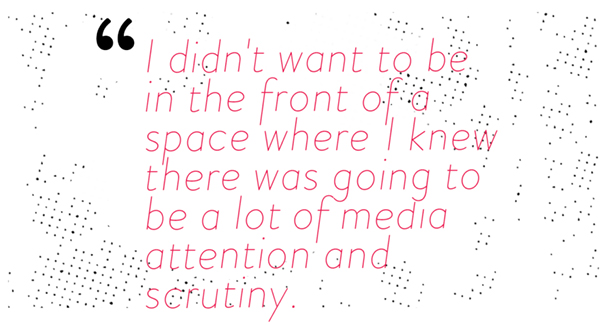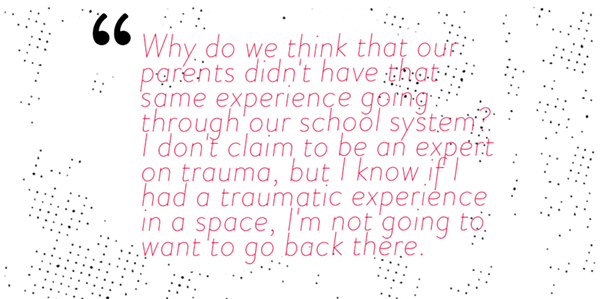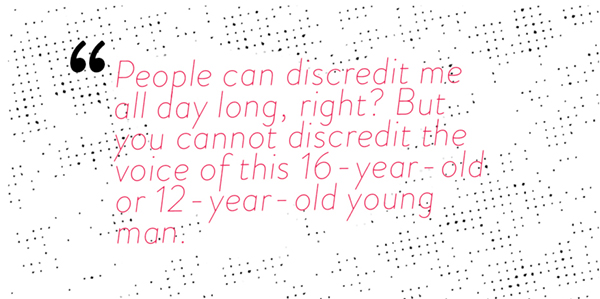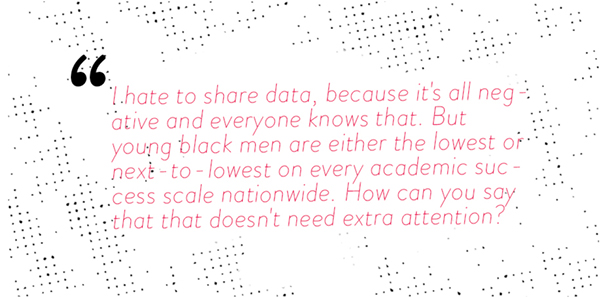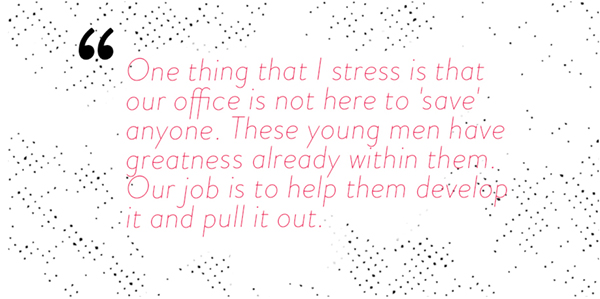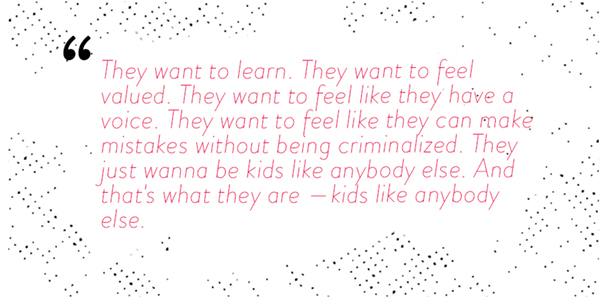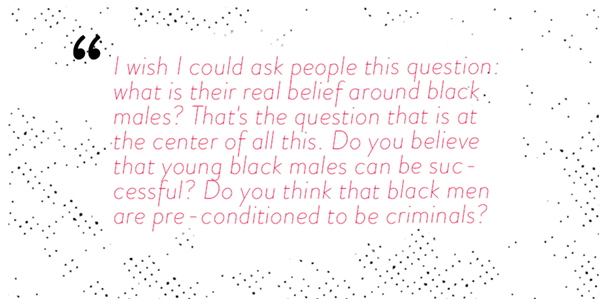
Abdul Majid Omari. Bartender. Nonprofit board member. U of M Regent. CEO. Uncle. Son. Avid fan of The Walking Dead.
If you were to see Abdul as a bartender serving your drink, would you value him the same way as you would if you were to see Abdul in a suit in the role of a regent approving a $3.7 billion budget for a major university?

Abdul specializes in leadership development by uncovering biases within team dynamics. He consults on cultural intelligence for organizations like Target, the University of Michigan, St. Cloud Public Schools, and the City of Minneapolis. In his practice, he asks the participants of his lectures to question and discover how personal characteristics and experiences play out in the workplace. To do this, he first asks each person to “think deeply about the headlines of their lives.”

“Everything comes back to where we have been, what we have done, and how we have
experienced the world.”
A headline of your life might be a death, a birth of a child, or a divorce. It could be related to identity. It could be an educational experience. In thinking about those things, and how that operates throughout your life, you can better connect with how others operate based on their experience.

Today, Abdul will help us put the ME in TEAM, so we can embrace identity and experience, no matter the setting.
But first, we must ask…
What are the
H E A D L I N E S
of Abdul’s life?

You can’t talk about Abdul without talking about his family.
![]()
“My family is integral and central to who I am.”
![]()
Let’s go back to Abdul’s childhood home.

Abdul’s mother is from Jordan. His father is from Kenya. The couple fell in love while studying at Minneapolis Community and Technical College. They are from different places. They are very different people. She is quiet and he is loud. She is Greek Orthodox. He is Muslim. She is compassionate. He is full of pride. But back in the 70s, they shared this: They didn’t care that their family disapproved of their disparate backgrounds and they built a life together. The Omaris raised their kids in South Minneapolis, in a big green house. By day, their home bustled with the combined energy of Abdul’s many siblings, visitors, aunts, uncles, cousins, and students first arriving from Kenya to study at the University of Minnesota. By night, Abdul stayed up dreaming of an ambitious future, taking comfort that his father was awake below, watering his beloved plants.
Abdul knew his family was different than many of the families in Minneapolis at the time. And he knew that each member of his family was very different. Take his sister, Mariam Halwa. She was caring to a fault, but his brother Omari was a free-spirited, self-proclaimed asshole that lived to the fullest and loved hard. Abdul could see the way each of his family members shaped his spirit and helped him grow.
Abdul has never stopped carrying the dynamics of his complicated family forward, and still uses the big green house to muster compassion for difference.
![]()

Q: HOW DO YOU SHOW UP?


“Imagine a person who shows up and leads in a very authoritarian framework; we can’t just dismiss that as poor leadership, we should be trying to identify why.
Why is it that this person wants to lead in this way? Was it the way they were educated? Was it the place they were brought up in? Is it a certain experience that they had?
I think about my dad’s parenting style. It was very authoritative. So, I intuitively led in the exact same way. Transition to today, I now appreciate a flat leadership style. It helps to think about our own leadership styles, to check whether or not we are leading in the best way.
I don’t tell people how to lead. I help them identify their leadership approach.”
![]()

What’s yours?

Even though Abdul has his PhD, he insists he was never very book smart. There is much to be learned from his fight to succeed.
 Abdul’s struggles forced him to contemplate the usefulness of a formal education. He agonized over how far to take his academic career. But he kept going, no matter what.
Abdul’s struggles forced him to contemplate the usefulness of a formal education. He agonized over how far to take his academic career. But he kept going, no matter what.
 There were slips here and there. Like his freshman year of college when Abdul watched SportsCenter three times a day and partied hard.
There were slips here and there. Like his freshman year of college when Abdul watched SportsCenter three times a day and partied hard.
 The thing that helped Abdul find a place at the University of Minnesota was a sense of community. This spark of belonging was ignited by his fraternity, Alpha Phi Alpha—the first black collegiate fraternity in the country. Beyond deep friendships, it taught him the importance of leadership and engagement.
The thing that helped Abdul find a place at the University of Minnesota was a sense of community. This spark of belonging was ignited by his fraternity, Alpha Phi Alpha—the first black collegiate fraternity in the country. Beyond deep friendships, it taught him the importance of leadership and engagement.
 But still, far into his academic path, Abdul struggled. “I knew that I would not succeed in my PhD program unless I significantly improved my writing. Everyone thought I was brilliant but I was sitting behind my computer crying because I couldn’t write.”
But still, far into his academic path, Abdul struggled. “I knew that I would not succeed in my PhD program unless I significantly improved my writing. Everyone thought I was brilliant but I was sitting behind my computer crying because I couldn’t write.”

Abdul needed help. “I was going to the writing center the first time, so full of pride I almost hesitated to go, and in walks a small little white girl. I was like—Fuck, I am going to get this seventeen-year-old, and I’m in a PhD program. And she says, ‘Abdul!’ And I go back with her and all we did for a 45-minute session was she asked the exact same question and I answered with the thesis of my paper until I could take what was in my brain and write it clearly. Pride was gone.”

Abdul tries to help others. “Graduate school, nonprofit boards, graduate school, board of regents—it’s all sexy. So I get a lot of people asking for advice, but too often I feel so god damn lost. I can’t stop, because I can’t let people down. The amount of time I have heard, ‘having you there makes me feel better about the future.’ About the university. About this. About that. It is a clash with the lonely island I feel like I am on. This is not a complaint. I feel fortunate, proud, and committed to being there.”
“There is this deep feeling like there is no way that you can stop because of other people. I don’t know how to explain it. But it is a lonely feeling.”


Q: HOW DO YOU LEAD ACROSS DIFFERENCE?


Abdul wants you to change the way you operate and think. He wants to help you find your blind spots. To do that, you have to look inward. Who are you? What are you bringing to work? When Abdul Omari speaks on cultural intelligence, he often uses the hit TV show about the zombie apocalypse, The Walking Dead, as an example of an ideal world.
“It is super fascinating how the sheriff—for whatever reason—is always in the leadership role. He leads people that are from everywhere. And you have Daryl who is like a hick, and a businesswoman from Chicago, the farmer, the racist, etc. He is like—I have to lead these folks. The only thing I know is that we operate better together then we will survive longer.”
Just imagine if it was life and death. We would be doing things so much differently.
“We are in the position to change real human lives, in small and big ways. We should do things differently. We should realize that the implications of our actions can change the course of someone’s life. Our choices can change the health, educational, and career outcomes for people. Maybe it is life and death.”


 As a kid, Abdul had to endure racism very close to home.
As a kid, Abdul had to endure racism very close to home.
“My mom’s family is racist as fuck. Like there is no denying it. We could go to my uncle’s house when nobody was there. He was big in the church—super strict Greek Orthodox. But we were not invited to attend the church. I always knew that my dad didn’t like going to the house, but I didn’t know why. I knew there was tension, but I didn’t know why. My mom was telling me recently that when I was young—and I barely remember—that when people from church came over, he made us go to the basement so that they wouldn’t see us. I’m not mad at them. This is what they knew then. We are now fully accepted by my mother’s family in Minnesota.”
 In 2013 Abdul’s brother passed away in a motorcycle accident.
In 2013 Abdul’s brother passed away in a motorcycle accident.
“My brother was Muslim, and when he died, my other brother and I washed his body, which is an Islamic tradition. I remember thinking how horrible and beautiful that was at the same time. And so it is interesting now to see how my family, who are so integral to the success in my life and inseparable to the story of my life, struggles with that. It has been fascinating to see my family grow together and in some cases grow apart. It has affected my parents and my siblings in an intimate way. No matter what we were, we will never be there again. We will never be the same.”

Q: ISN’T IT HARD TO BE A HUMAN?


From racist family members to the death of a brother, Abdul’s headlines give us insight into how he has shaped his views. According to Abdul, we walk into the world everyday with a way—or ways—of knowing. He urges us to try and keep an ever evolving collection of ideas, by embracing curiosity for others, if not empathy. Ask questions. Don’t settle for the surface. Think about what informed the experiences of the humans that sit across from you every day. From those closest to you to strangers on the bus—you never know what’s going on in someone’s life. Abdul believes if you try to remember this, you start to acknowledge that people are whole, complex creatures.
![]()


According to Abdul, we need to be cognizant of when our identities offer us privilege, and notice what people can see versus what they can’t see.
 Not long ago, Abdul took a few students to buy suits. The owner of the upscale boutique approached the men and said, “Oh, are you guys the next singing group for Motown?” (As if that was a good way to open the conversation.) Abdul responded “Actually, no. But we might own the label. Hello, I am Doctor Abdul Omari.” Abdul has learned that certain identities outweigh each other in certain contexts. When is Abdul “Doctor Abdul?” When is he just Abdul? For example, when Abdul is in front of a class, he has to choose which identity he will lean into as a professor. “I don’t have hair, but people think I am younger than the stereotypical professor. I will not want to lean on that identity if I want to gain authority. I am a person of color. Depending on the topic of the day I might lean on that identity, I might not. These identities and how they play out in different areas of leadership matter significantly. I very infrequently introduce myself as ‘Doctor’ unless someone is being an asshole and I need to prove I am very capable.”
Not long ago, Abdul took a few students to buy suits. The owner of the upscale boutique approached the men and said, “Oh, are you guys the next singing group for Motown?” (As if that was a good way to open the conversation.) Abdul responded “Actually, no. But we might own the label. Hello, I am Doctor Abdul Omari.” Abdul has learned that certain identities outweigh each other in certain contexts. When is Abdul “Doctor Abdul?” When is he just Abdul? For example, when Abdul is in front of a class, he has to choose which identity he will lean into as a professor. “I don’t have hair, but people think I am younger than the stereotypical professor. I will not want to lean on that identity if I want to gain authority. I am a person of color. Depending on the topic of the day I might lean on that identity, I might not. These identities and how they play out in different areas of leadership matter significantly. I very infrequently introduce myself as ‘Doctor’ unless someone is being an asshole and I need to prove I am very capable.”
 Always ask yourself: What voices are lost in a group setting? If a voice is not in the room, how do your identities show up? “I once worked for a museum in the middle of a slum in Cape Town, South Africa. Before we were able to dive into the work, they had us spend weeks learning about the community’s history and dynamics. I was originally frustrated by this, but our instructor explained the importance of gaining an understanding—as outsiders—of the intricate components that would lead us to a dynamic point of action. In my view this is directly related to having all voices at the table before we jump into doing. Of course, this can be inefficient in some people’s minds. And there is a balance, because at some point we have to get to action. But just ask yourselves: How can you bring other voices into the room that might not be in there? It is our responsibility as leaders to make sure that there is an inclusive environment so that all the identities that are in the room are able to share their expertise.”
Always ask yourself: What voices are lost in a group setting? If a voice is not in the room, how do your identities show up? “I once worked for a museum in the middle of a slum in Cape Town, South Africa. Before we were able to dive into the work, they had us spend weeks learning about the community’s history and dynamics. I was originally frustrated by this, but our instructor explained the importance of gaining an understanding—as outsiders—of the intricate components that would lead us to a dynamic point of action. In my view this is directly related to having all voices at the table before we jump into doing. Of course, this can be inefficient in some people’s minds. And there is a balance, because at some point we have to get to action. But just ask yourselves: How can you bring other voices into the room that might not be in there? It is our responsibility as leaders to make sure that there is an inclusive environment so that all the identities that are in the room are able to share their expertise.”
Q: Why should we lean into our identities?


Abdul helps us see that unwelcoming group conversations dominated by a powerful few settle over a team like a thick fog; it can be difficult to break through to full collaboration. There must be intentional space for people talk about their opinions and experience. Without it, because of our biases, we might be putting a damaging price tag on people, on their experiences, and on their “value”—or we may not even realize certain experiences exist. “It is our responsibility as leaders to make sure that there is an inclusive environment so that all the identities that are in the room are able to share their expertise. Productivity is increased when people are happy and can be their authentic selves at work.
There’s a term called uncovering talent and it gets at the idea of people covering their identities when inclusion is lacking. And when we cover our identities, we are often missing out on the opportunity to provide talented perspectives to a conversation at work. Therefore, hurting ourselves (mentally) and hurting the bottom line. Balance people’s headlines and identities without tokenizing them. Instead of calling on the only person of color in a room to talk about a topic related to race, ask: Is there anyone who can speak to this and would like to? And it never hurts to ask an individual if you can call on them in a group setting before the meeting starts. 


In Abdul’s first year of his PhD program, he went to Washington, D.C. to lobby on behalf of graduate students.
“Long story short, I was charged with a felony assault. I spent a couple days in jail (the longest days ever). They wanted to fry me—four to seven years.”
Abdul was alone. He remembers crying into his copy of Pedagogy of the Oppressed while studying at the library at 6 AM, wondering if he would serve time and hoping he would still have the future he dreamed of as a little boy.
But Abdul did not go to jail. He plead to a misdemeanor simple assault and has had a criminal record ever since. A judge told him a record would be his greatest punishment. And Abdul has been punished. The charge follows him. It popped up while he was traveling to Ontario for a review of a university. He was stopped at the Canadian border and refused entry. It popped up when he was set to teach at Augsburg College. He almost didn’t apply to join the Board of Regents at the University of Minnesota because of it.
Abdul wonders if he would have been given that plea if he didn’t have a squeaky clean record. For those who don’t have a master’s degree, who don’t have recommendations, who are not in PhD programs—how would this situation have turned out differently?
By definition, Abdul is a criminal. He is not denying or negating that fact. But in his words: “Damn. This dude fucked up. And I am very remorseful for the gentleman I was in the altercation with. But I fucked up. But I am not a bad person. I can be a productive member of society. I can make a difference in at least one person’s life, even though I fucked up. Hopefully, I can be an example of someone that messed up, and can still be valuable to the world.”

How can we consider people’s headlines in the way we interact? The way that we hire? The way we see someone as valuable?
Life and death, remember? The implications of our actions can change the course of someone’s life.
“We are going to be in situations where we might be hiring someone. We all have unconscious biases when we see criminal activity, where someone went to school, their age, gender, ethnicity, race. The reality is, if we are not getting past that, we are going to miss a lot of people. We are going to miss out on talent. We are going to put people in situations where they are not able to thrive and succeed.”


Q: So what?


If Abdul has one ask for the Pollen audience, it is to remember the humanity behind the paperwork, the cubicle, the title, and the suit that stand in for real bodies, real hopes, and real lives. Be curious about people’s identities and experiences and create spaces that allow them to show up fully. You just might learn something about yourself, about someone else, about the impact of your words and actions, about the interconnectedness that exists between every single one of us.



Contributors








